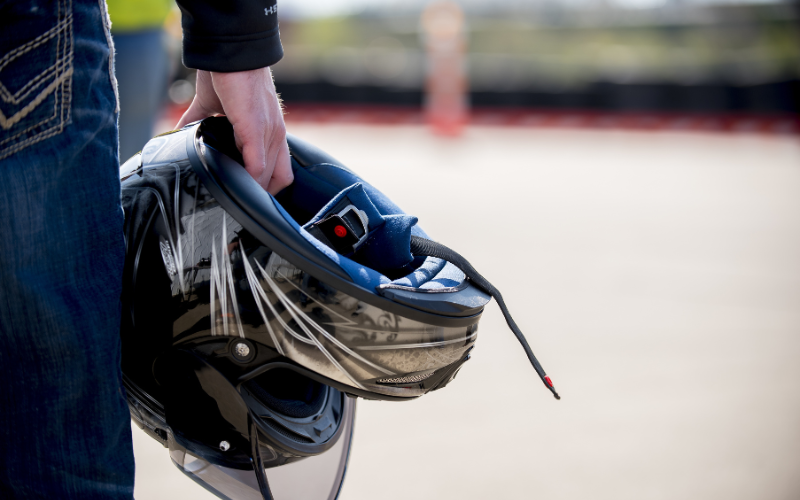Why You Should Always Wear a Helmet When Riding a Motorcycle

Helmets are vital to riding safely and you can be fined if you and any passengers are found to not be wearing one.
Riding your motorcycle is designed to be a fun and enjoyable experience. But it should also be safe too. After all, your bike is a big investment, so why wouldn’t you want to savour it for years to come?
Helmets are a big part of your safety on the road and without them, you can put your life at risk.
We’ve rounded up everything you need to know about motorcycle helmet safety.
Motorcycle helmet safety standards and legal requirements
It’s important that you buy a helmet that carries the BSI Kitemark and meets the British Standard BS 6658:1985.
The following helmets are also legal in the UK:
- UNECE Regulation 22.05 (also known as ECE 22.05)
- A European Economic Area member standard offering at least the same safety and protection as BS 6658:1985 – it must also carry a mark equivalent to the BSI Kitemark.
When choosing a helmet that meets safety standards, we would also recommend checking the SHARP rating. The Safety Helmet Assessment and Rating Programme was introduced in 2007 by the Department for Transport. It aims to help riders make an informed choice around the best crash helmet.
SHARP uses a one-to-five-star rating system to show how much protection a helmet offers. To determine this, each helmet undergoes 32 impact tests at various speeds.
How to find the right fit
Finding a helmet that meets safety standards is crucial, but it’s equally as important to find the right fit. If your helmet doesn’t fit correctly, its effectiveness could be reduced if you are involved in an accident.
We would always recommend trying on a few different helmets before you settle on your final choice.
When trying helmets on, it’s important that you put it on the back of your head first and then let it slide down. Always try to avoid putting the helmet on straight down.
You should also make sure that:
- It fits closely around your head and tight around your cheeks.
- If you bend your head forward the chin guard doesn’t touch your chest.
- If you bend your head backwards the helmet shouldn’t touch your back.
- If you move the helmet there’s no excessive movement from side to side or up or down.
- If you have long hair, don’t tuck it in the helmet as it will affect the fit around your head.
Insurance requirements for motorcycle helmets
Many insurance companies in the UK have requirements surrounding motorcycle helmet safety. If you are involved in an accident and are found to be wearing a damaged or non-compliant helmet, your insurance claim can be affected.
This could lead to costly repairs for you and any other parties involved.
A helmet can save your life
If you are involved in an accident and you are wearing a helmet, you can significantly reduce the risk of serious head or brain injuries.
According to the World Health Organisation, you can reduce the risk of brain injury by 74% from simply wearing a motorcycle helmet. Across the world, head trauma continues to be one of the leading causes of death among riders.
Fines for not wearing a motorcycle helmet
You can be fined up to £500 in the UK if you are found to be riding a motorcycle without a helmet. This law was introduced on 1st June 1973.
Any passengers riding with you could also be fined if not wearing a helmet.
Regular motorcycle helmet checks
While regular motorcycle helmet checks are not mandated by UK law, they are recommended. If your helmet is showing signs of wear or damage, it will no longer provide the same level of protection as it did new.
If your helmet has degraded over time, it may also no longer comply with safety standards which could result in legal implications.
All new helmets are also covered by a manufacturer's warranty. Without regular checks, you could invalidate your warranty.
We always advise getting your helmet checked in line with the manufacturer’s recommended schedule.
If at any time you need your helmet checked, you can visit your local Vertu Motorcycles dealership for a free check.
How often should I change my motorcycle helmet?
As a rule of thumb, it’s a good idea to change your helmet every three to five years. However, this will depend on how often the helmet is used. If you wear it every day and the helmet is exposed to the sun, it may need changing sooner.
If you are involved in an accident, you must buy a new helmet immediately to maintain your safety on the road.
Upgrade your helmet at Vertu Motorcycles
At Vertu Motorcycles, we stock a wide range of helmets from Honda , BMW Motorrad and Ducati. Our expert team can help you find the right helmet for your needs and ensure the perfect fit for your safety.
Visit your local Vertu Motorcycles dealership today to discover our full helmet range.